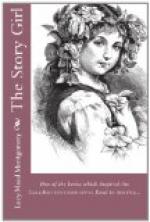“And I wish I hadn’t been in such a hurry deciding I’d be a Presbyterian,” said Peter.
“Well, it’s not too late for that,” said Dan. “You can change your mind now.”
“No, sir,” said Peter with a flash of spirit, “I ain’t one of the kind that says they’ll be something just because they’re scared, and when the scare is over go back on it. I said I’d be Presbyterian and I mean to stick to it.”
“You said you knew a story that had something to do with Presbyterians,” I said to the Story Girl. “Tell us it now.”
“Oh, no, it isn’t the right kind of story to tell on Sunday,” she replied. “But I’ll tell it to-morrow morning.”
Accordingly, we heard it the next morning in the orchard.
“Long ago, when Judy Pineau was young,” said the Story Girl, “she was hired with Mrs. Elder Frewen—the first Mrs. Elder Frewen. Mrs. Frewen had been a school-teacher, and she was very particular as to how people talked, and the grammar they used. And she didn’t like anything but refined words. One very hot day she heard Judy Pineau say she was ‘all in a sweat.’ Mrs. Frewen was greatly shocked, and said, ’Judy, you shouldn’t say that. It’s horses that sweat. You should say you are in a perspiration.’ Well, Judy promised she’d remember, because she liked Mrs. Frewen and was anxious to please her. Not long afterwards Judy was scrubbing the kitchen floor one morning, and when Mrs. Frewen came in Judy looked up and said, quite proud over using the right word, ’Oh, Mees Frewen, ain’t it awful hot? I declare I’m all in a Presbyterian.’”
CHAPTER XXI. DREAMERS OF DREAMS
August went out and September came in. Harvest was ended; and though summer was not yet gone, her face was turned westering. The asters lettered her retreating footsteps in a purple script, and over the hills and valleys hung a faint blue smoke, as if Nature were worshipping at her woodland altar. The apples began to burn red on the bending boughs; crickets sang day and night; squirrels chattered secrets of Polichinelle in the spruces; the sunshine was as thick and yellow as molten gold; school opened, and we small denizens of the hill farms lived happy days of harmless work and necessary play, closing in nights of peaceful, undisturbed slumber under a roof watched over by autumnal stars.
At least, our slumbers were peaceful and undisturbed until our orgy of dreaming began.
“I would really like to know what especial kind of deviltry you young fry are up to this time,” said Uncle Roger one evening, as he passed through the orchard with his gun on his shoulder, bound for the swamp.
We were sitting in a circle before the Pulpit Stone, each writing diligently in an exercise book, and eating the Rev. Mr. Scott’s plums, which always reached their prime of juicy, golden-green flesh and bloomy blue skin in September. The Rev. Mr. Scott was dead and gone, but those plums certainly kept his memory green, as his forgotten sermons could never have done.




